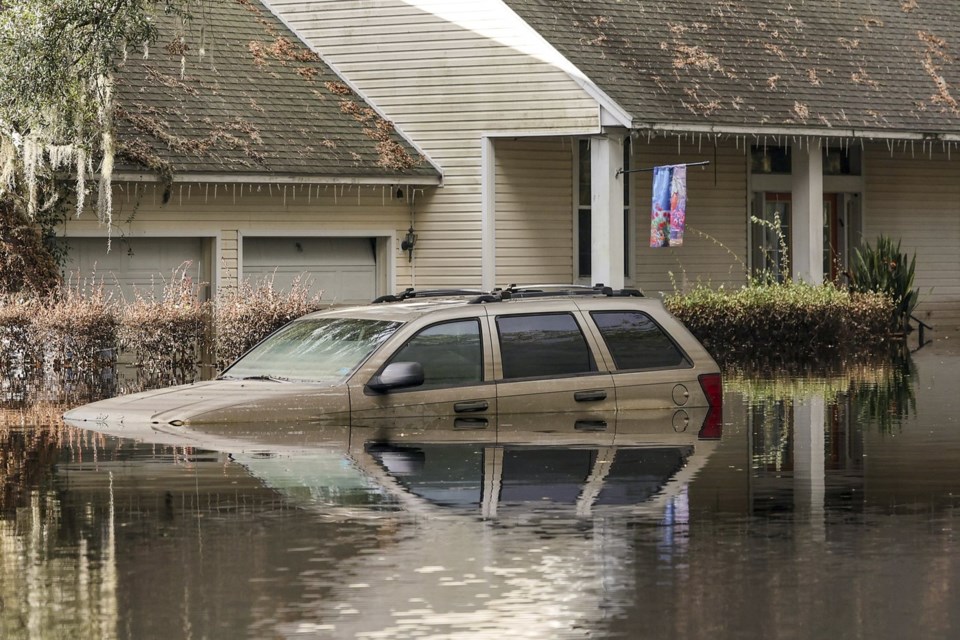The National Oceanic and Atmospheric Administration will no longer track the cost of climate change-fueled weather disasters, including floods, heat waves, wildfires and more. It is the latest example of changes to the agency and the Trump administration limiting federal government resources on climate change.
NOAA falls under the U.S. Department of Commerce and is tasked with daily weather forecasts, severe storm warnings and climate monitoring. It is also parent to the National Weather Service.
The agency said its National Centers for Environmental Information would no longer update its Billion-Dollar Weather and Climate Disasters database beyond 2024, and that its information — going as far back as 1980 — would be archived.
For decades, it has tracked hundreds of major events across the country, including destructive hurricanes, hail storms, droughts and freezes that have totaled trillions of dollars in damage.
The database uniquely pulls information from the Federal Emergency Management Agency’s assistance data, insurance organizations, state agencies and more to estimate overall losses from individual disasters.
NOAA Communications Director Kim Doster said in a statement that the change was “in alignment with evolving priorities, statutory mandates, and staffing changes.”
Scientists say these are becoming increasingly , costly and . Experts have attributed the growing intensity of recent , , the and to climate change.
Assessing the impact of weather events fueled by the planet's warming is key as , particularly in communities more prone to flooding, storms and fires. Climate change has wrought havoc on the insurance industry, and homeowners are at risk of skyrocketing rates.
One limitation is that the dataset estimated only the nation's most costly weather events.
The information is generally seen as standardized and unduplicable, given the agency's access to nonpublic data, and other private databases would be more limited in scope and likely not shared as widespread for proprietary reasons. Other datasets, however, also track death estimates from these disasters.
Jeff Masters, a meteorologist for Yale Climate Connections, pointed to substitutes from insurance brokers and the international disaster database as alternative sources of information.
Still, “The NOAA database is the gold standard we use to evaluate the costs of extreme weather,” Masters said, “and it’s a major loss, since it comes at a time when we need to better understand how much climate change is increasing disaster losses.”
These moves also don’t “change the fact that these disasters are escalating year over year,” Kristina Dahl, vice president of science at nonprofit climate organization Climate Central. “Extreme weather events that cause a lot of damage are one of the primary ways that the public sees that climate change is happening and is affecting people."
“It’s critical that we highlight those events when they’re happening,” she added. “All of these changes will make Americans less safe in the face of climate change.”
The move, reported Thursday by CNN, is yet another of President Donald Trump’s efforts to remove references to climate change and the impact of greenhouse gas emissions on the weather from the federal government’s lexicon and documents.
Trump has instead prioritized allies in the , which .
The change also marks the administration's latest hit overall to the weather, ocean and fisheries agency.
The Trump administration on probationary status in February, part of Elon Musk's Department of Government Efficiency efforts to downsize the . It began a second round of , more than 10% of its workforce at the time.
At the time, insiders said would risk lives and . Experts also noted fewer .
More changes to the agency are expected, which could include some of .
The agency's weather service also of its products last month — though it just weeks later.
___
Read more of AP’s climate coverage at .
___
Data journalist Mary Katherine Wildeman contributed from Hartford, Connecticut.
___
Alexa St. John is an Associated Press climate reporter. Follow her on X: . Reach her at [email protected].
___
The Associated Press’ climate and environmental coverage receives financial support from multiple private foundations. AP is solely responsible for all content. Find AP’s for working with philanthropies, a list of supporters and funded coverage areas at .
Alexa St. John, The Associated Press




